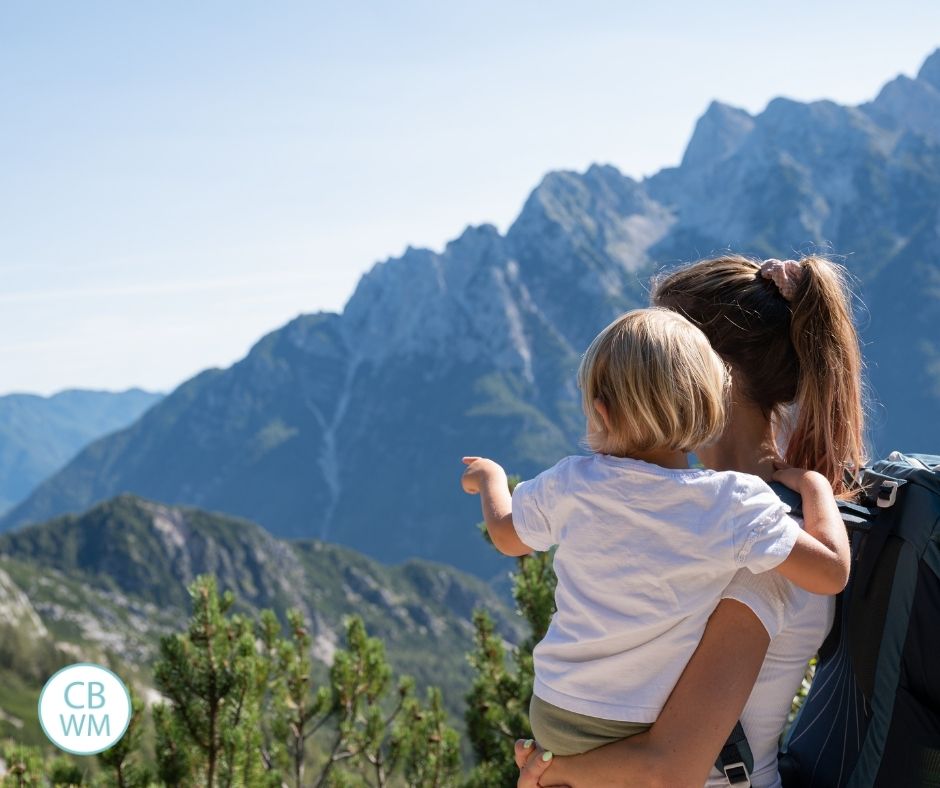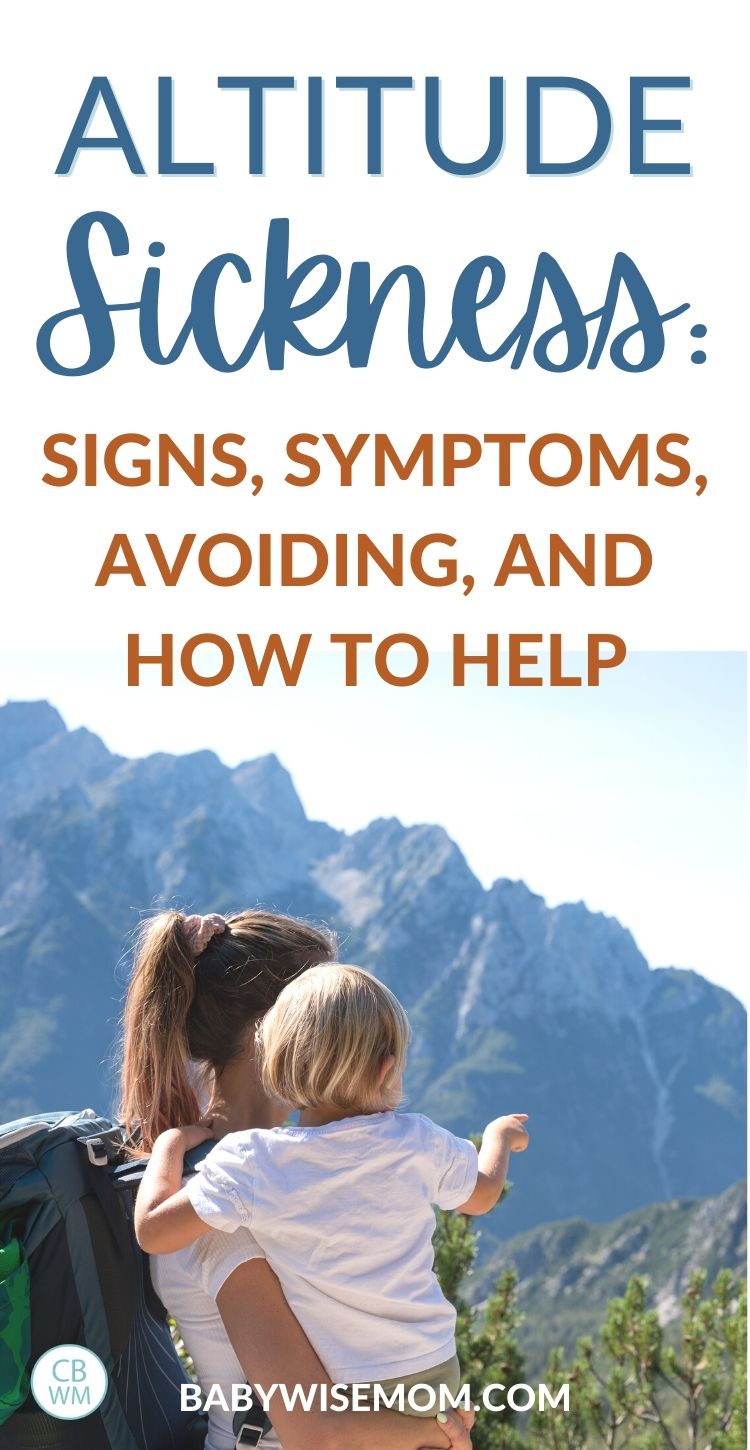When you travel to higher elevations, it is important to watch for signs of altitude sickness and avoid your kiddo from getting sick.

Altitude sickness is when your body is taking in less oxygen than you are used to.
Several weeks ago, one of my moderators for the Chronicles Google Group was on a business trip with her infant son.
During the trip, her son basically did not sleep–no napping and no sleeping at night. She was of course tired and concerned.
Her son has reflux, and they were far from home, so most of us mods attributed it to reflux issues combined with traveling issues.
On the drive home, her son finally calmed down and slept peacefully for naps and almost perfectly through the night. She did some digging because she felt like something more had been affecting him on his trip.
What she discovered was altitude sickness. She lives at sea level and had traveled to 7000 feet in 13 hours–quite the change.
I would bet most of us are at least vaguely familiar with the concept if we watch sports at all. Any athlete traveling to a higher altitude can have trouble breathing and performing at a higher elevation.
You can even to so far as to feel sick. We have all heard of mountain climbers forced to stop their climb due to altitude sickness.
There is nothing I like more than to drop 3000 feet and go hiking. I feel like a superwoman. There is nothing that makes me feel more lethargic than to jump 2000 feet and try to hike…not impressive.
Post Contents
Signs of Altitude Sickness
When you move to a higher elevation, the change in air pressure leads to you getting less oxygen with each breath. This can lead to you feeling sick.
You are most likely to get altitude sickness at 8,000 feet or higher, and someone who is not used to higher altitude is more likely to get sick than someone who spends time in higher altitudes.
Common signs are difficulty sleeping. Your kiddo’s appetite might be low. He might be grumpy or irritable. She can have a headache, be dizzy, or be super tired. There can be nausea or vomitting. There can also be difficulty breathing when doing exercise.
You can also have confusion and a blueish complexion. A cough can develop.
Tips to Avoid Altitude Sickness
Here are some basic tips:
- Move to higher elevations as slowly as possible if you are jumping to extreme altitude (extreme in relation to you). Basically, if you drive, that should be a slow enough adjustment. If you fly, you might need to be more cautious about sickness.
- Eat foods rich in potassium, such as bananas, greens, avocados, dried fruit, potatoes, and tomatoes. These will help you accimatize faster.
- Avoid foods high in salt.
- Higher altitudes can make you colder, so watch baby’s temperature closely.
- Keep baby well hydrated. Altitude sickness is often caused by dehydration.
- Higher altitude means closer to the sun. Cover skin, use sunblock, and stay in the shade.
- Higher altitudes are dryer. A humidifier helps moisturize the air.
How to Help Altitude Sickness
If your child seems to have altitude sickness, try the following.
You will want to rest and give the body a break.
You can move to a lower altitude for a couple of days. Sypmtoms tend to subside within 24 hours of going 1,000-2,000 feet lower.
At the very least, you should avoid going any higher in altitude for 1-2 days. Avoid exercise while symptoms persist.
If your child is old enough, pain killer can help ease a headache.
If there is vommitting, it is important to offer water and something with electrolytes to help replenish lost fluids.
Deep breathing can help get the oxygen in that is needed.
Conclusion
This information can help you be prepared and aware when you take a vacation and jump elevations. Now you know to watch for altitude sickness and how to help your kiddo if it sets in.
Related Posts
- Utah National Parks with Kids Travel Tips
- Grand Canyon Travel Tips for Families
- How To Plan the Perfect Family Vacation
- Things To Do in Denver as a Family
- General Travel Tips
- Tips for Packing for Your Baby for a Vacation
- Tips for a Successful Camping Trip with Children


Great tips!. It is easy to forget things like this when traveling to exciting places.I got altitude sickness about a month after moving to Cheyenne, WY (6,100 feet ASL) back in 1987 and it was due to dehydration. I was hospitalized for about three days.
Thanks for posting this! I have an 11 week old, and we live in South GA. We are going to Tennessee to stay in a cabin for a week and was wondering if the elevation might affect him.
Which is why we haven't taken our kids hiking any 14ers yet, even though we'd love to! :)Also, I COMPLETELY agree with you on Babycenter. They have some good stuff and a lot of total crud. I disagree with about 40% of the information they have, am neutral on about 40%, and agree with about 20%.
Ozz, how awful!
Katie, I am glad I am not the only one!